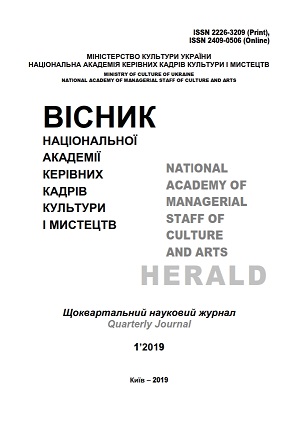Адміністративна культура менеджменту в епоху індустріального суспільства
An Administrative Culture of Management is in the Epoch of Industrial Society
Author(s): Elena Yaroslavivna KovalenkoSubject(s): Social Philosophy, Culture and social structure , Management and complex organizations, Sociology of Culture, Economic development, Socio-Economic Research
Published by: Національна академія керівних кадрів культури і мистецтв
Keywords: the administrative culture of management; industrial society; features;
Summary/Abstract: The purpose of the article is a theoretical analysis of the administrative culture of management which will be instrumental in enriching of humanitarian science new knowledge about becoming and development of a culture of management in the epoch of industrial society. Methodology of research is the dialectical principle of cognition, sociocultural and historical approaches of the systems, fundamental positions of theory and history of management culture. The scientific and interdisciplinary methods of research are used: analysis and synthesis, induction and deduction, comparison and formalization. The scientific novelty of the got results consists of exposure and generalization of features of the culture of administrative management of epoch of industrialism. Conclusions. In accordance with this culture, the organization is examined as an integral social organism, where every component takes strictly outlined place and functions which harmonious coordination is between. A man in the process of labor behaves rationally how requires a plan, and a manager executes the functions of system inspector. There are six functions in an organization: technical, commercial, financial, insurance, registration, administrative. To manage – means to provide their action. Administration – it only one of them. She is the sphere of activity of top management and includes such elements: foresight, organization, bossing, coordinating, control. Works of representatives of the theory of culture of administrative management lie in the basis of modern culture and art of management. They are united by aspiring to the creation of the code of universal principles on the basis of which it is possible it would be to make the best administrative decisions. It is fourteen principles H. Fayol, ten principles of L. Gulick, three principles of J. Mooney and A. Reiley, and also a vault of synthetic rules of L. Urwick, which integrate all these principles. Today they are examined as fundamental bases of the art of management.
Journal: Вісник Національної академії керівних кадрів культури і мистецтв
- Issue Year: 2019
- Issue No: 1
- Page Range: 155-161
- Page Count: 7
- Language: Ukrainian

